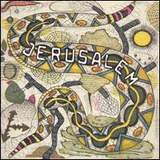
http://www.kindamuzik.net
ernaast
Onze laatste liverecensie.
Onze laatste albumrecensie.
Ons laatste interview.
Onze laatste video.
Steve Earle | Jerusalem
Controversial in a way, but also another fine record by an extraordinary singer-songwriter.
CD, E-Squared/Artemis/Epic
Tekst: Robert Brown
Publicatiedatum: 26 september 2002

Steve Earle's latest album, Jerusalem, is almost as inextricably entwined with the current zeitgeist as Bruce Springsteen's The Rising, as both albums deal explicitly with the state of affairs in America since 09-11-01. That's as far as the comparison goes. Whereas the one means to soothe and to inspire hope and warmth in the hearts of his listeners, the other serves a direct slap to the face, addressing the bigotry and hate that have come to surface in America since the events of the past year. If you know anything about these two artists, you'll figure out which is which.
Tell you what: I'll give you a hint. In the Americana scene Steve Earle has a well-deserved reputation as hard-hitting chronicler of the lesser and darker sides to America's history and existence. He has spoken out against the death sentence in songs like Ellis Unit One (from the Dead Man Walking soundtrack) and Jonathan's Song (Over Yonder) (from 2000's Transcendental Blues). He has addressed the plight of early America's Appalachian miners on his 1999 masterpiece The Mountain (with the Del McCoury Band). In many, many other songs he has handled similar subjects of corruption, oppression and injustice. He instinctively empathizes with the underdogs, the outcasts, the less desirable elements, the people you don't really want to hear about, and has an uncanny ability to bring them to life in lyrics and songs that are often difficult to dismiss and, at times, almost impossible to ignore.
Which brings us to Jerusalem, which could well prove to feature some of his most controversial work to date. Justice, truth, tolerance, peace, democracy; a large part of Jerusalem revolves around these themes. Hard questions are raised about the behaviour and attitude of America as a nation in the wake of those tragic events in September last year. Take, for instance, John Walker's Blues, sung from the perspective of the Al-Quaida soldier captured in Afghanistan, who turned out to be an American citizen by birth. His story was unheard up to now, and many would rather leave it at that. Steve Earle tells it just the same, the tale of a man caught in a shallow and self-centred society that oppresses and demeans him, and how he finds his place in the Islamic teachings and culture. This is Steve Earle at his best, a storyteller that can get to the core of the most complex, distressing ethical dilemma's and emotional crises in the course of just a couple of verses. By the end of John Walker's Blues you'll find yourself wondering about the motives of that man who'll go down in history as a traitor to his people and his country. You'll be right where Steve wanted you in the first place: Thinking twice about those things that you so easily hold to be true and right and wrong.
Musically, Jerusalem does not explore any territory that Steve Earle hasn't travelled before. He plays with the traditional confines of country and western territory, throwing in some intriguing samples and rhythm loops, using a heavier and rougher production of the guitars and drums than what's usually done in the genre. That said, Jerusalem is stylistically his most straightforward and consistent piece of work since 1996's I Feel Alright. No ventures into bluegrass, psychedelic pop, Irish folk or gospel music this time: Right now Steve feels like rocking, and his band The Dukes are happy to assist him. They stomp and grind their way through the dual opening salvo of "Ashes To Ashes" and Amerika V. 6.0 (The Best We Can Do), before relaxing somewhat into the intriguing groove of Conspiracy Theory, with sensual vocals by Siobhan Maher-Kennedy in the chorus. Other highlights are the afore-mentioned John Walker's Blues, with hints of Arabic influences in melody and lyrics, and the dark and threatening The Truth. The easy swagger and swing of Go Amanda, Shadowland and the Cajun-tinged What's A Simple Man To Do? have that flair and bravura that typify Steve Earle rockers. Add the gentle touches of The Kind and I Remember You (a duet with Emmylou Harris) for a little peace and quiet. The thoughtful and brooding Jerusalem closes the album and sums up the themes explored mainly in the first half of the album: " I believe that one fine day all the children of Abraham will lay down their swords forever in Jerusalem".
In closing, it can be said that Jerusalem isn't extraordinary. It's simply another fine record by an extraordinary singer-songwriter; an artist whose enormous value and influence can be measured by the high standard of his art as well as his exceptional strength of character, compassion and integrity; who uses his music to address difficult and provocative issues in a time when everyone seems to be looking for the easiest answers and quickest solutions. It is by this definition that Jerusalem is yet another essential Steve Earle album.
http://www.kindamuzik.net/recensie/steve-earle/jerusalem/1893/
Meer Steve Earle op KindaMuzik: http://www.kindamuzik.net/artiest/steve-earle
Steve Earle audio en video:
» Interview: Steve Earle: over drugs en de kunst van de bonsai boom (Lola da Musica 16-11-200) (3voor12)» Audio: Rich Man's War (3voor12)
» Audio: F The CC (3voor12)
Vind je Steve Earle goed? Lees dan ook bij KindaMuzik over:
» Darrell Scott» Billy Bob Thornton
» Joe Ely








Deel dit artikel: